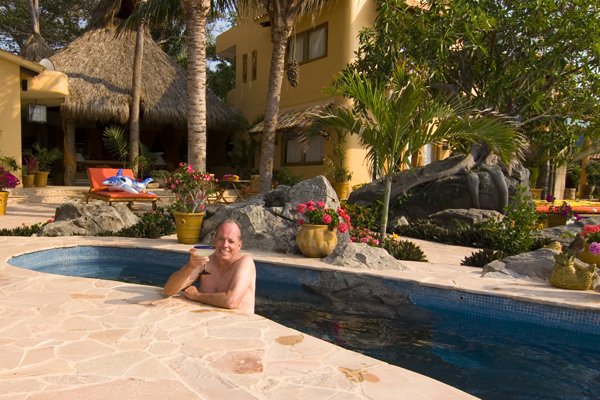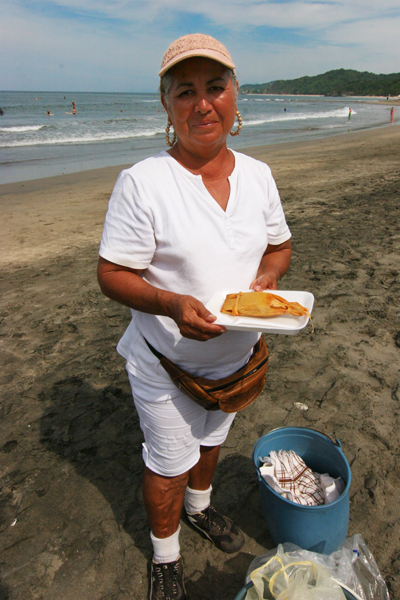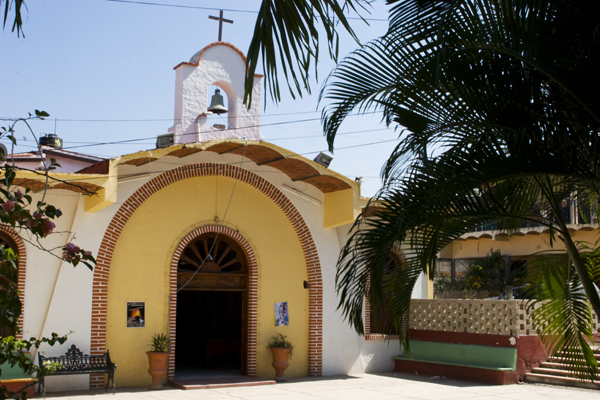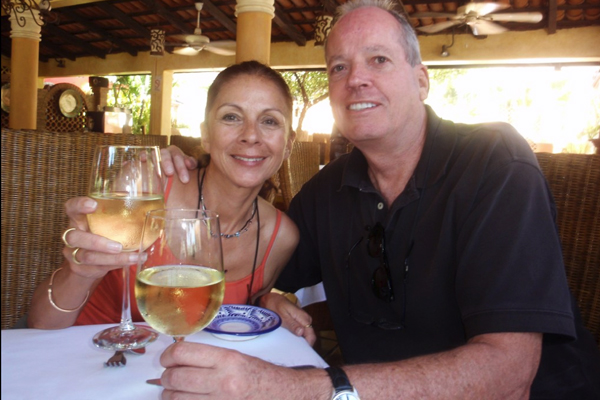I drove up to the Fletcher’s house in Custodio on Saturday. Usually it’s a 90 minute drive through the jungle from my place in Bucerias but on Saturday it took me well over two hours, mostly because my car, the Blue Whale, wasn’t feeling well. At first her brakes were sticking, pulling me left or right on the road, and then they started locking up. By the time I reached Zacualpan, they weren’t working at all. Which isn’t a huge problem since the road at this point is just a pothole-filled country lane through farm country where you’re more likely to see tractors and horses than another car. You wouldn’t normally go faster than about 30 along here; I just cut it to about 15 or 20 and coasted whenever I could. Going back home on Sunday would be a challenge, but I’d worry about that later.
Both Chris and his brother, Dave, weren’t there when I finally arrived. They were in the annual homeowners association meeting, an all day affair. I don’t know anything about their HOA but I know the one I belong to at Punta Esmeralda is stacked with a few looneys and the annual meetings are something to be avoided at all cost. I think the same might be true of the HOA at Custodio but both Chris and Dave are far more judicious and patient than I am so it’s probably just as well that they actually go to this thing. So while they were arguing about whatever it was they were arguing about, I sat in their pool with a margarita watching the pelicans fly by. The weather was exceptionally pleasant.
Mechas was there, of course, as well as Signe, who was napping on an outdoor bed shaded by a strangler fig tree, and the Fletcher’s mother, Sally who is really one of my favorite people in the world, largely because she likes me to tell her stories, whether they are true or not, and I like telling them to her. She was sitting under the shade of a palapa reading a book on her Kindle and when she saw me, she patted the chair next to her and said, “David, come over here and tell me a story.”
I said, “Sally, you’ve heard all my stories.”
“It doesn’t matter,” she said, “just tell me one in a different way or make a new one up.”
I love that about her.
That night there was a party at one of the other houses to celebrate the end of the annual meeting (when you see how relieved everyone is to have this unpleasant event over with and how anxious people are to quickly have a margarita and then another one, you begin to understand how all the quirky little customs associated with religion, like killing sheep or drinking wine, got started). I sat across from two women I’d never met before. One was an attractive woman named Laura who was dating one of the homeowners, Frank, and the other was an equally attractive woman named Pam who, along with her husband Brian, were close friends with Frank. Pam told me she was a therapist—up in Vancouver or maybe Calgary?—and asked me what I did.
“Well, I used to be an astronaut,” I told her. “But I’m not any more. I got booted out of NASA because of a drinking problem.”
“Really?” said Pam.
“Well, that and I was a sex addict.”
At this point Laura started to lean into the conversation. So I explained to both of them how I’d been married six times and then introduced them to Mechas, who was sitting on my right, and told them we’d just met two days ago and gotten married this morning. “So we’re here on our honeymoon,” I told them, clinking margarita glasses with Mechas.
“You two just got married today?” Pam asked incredulously.
“Just this morning,” said Mechas. “He’s impetuous.”
It went on like this for awhile. The problem with telling whoppers like this is that if they are not quickly seen for what they are, you end up solidifying the story until it becomes hard as concrete and then you don’t know how to get yourself out of it. Because if you finally say, “Oh, I’m just pulling your leg,” you make the people feel bad. Because they believed you. So then you only have two choices: either keep going with your stories, digging your hole deeper, or politely excuse yourself from the table and leave the party.
I was just about at this point and trying to decide what to do about it when Mechas got up to get herself another drink. Pam leaned over conspiratorially and put a single hand on my arm. “She doesn’t really seem like your type,” she whispered.
“No?” I said.
Pam shook her head. “Not really astronaut’s wife material if you know what I mean.”
I didn’t. But what did it matter?






Recent Comments